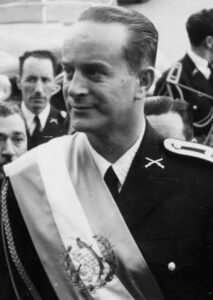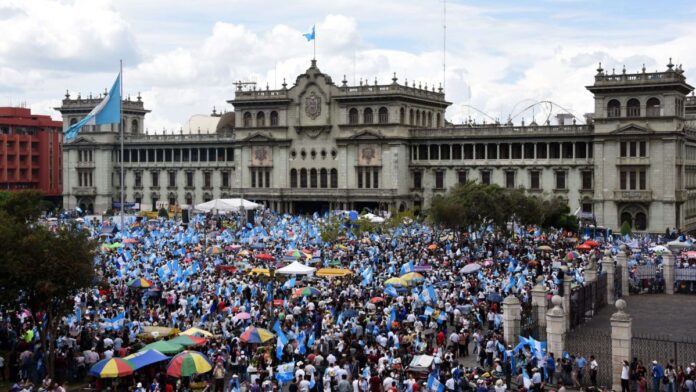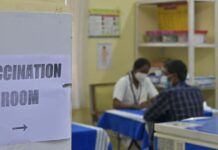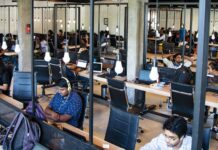On 21 November 2020, protests began across the country of Guatemala. The protests arose after the country was hit by two disasters. One was the COVID pandemic. The other was two hurricanes in early November, Eta, and Iota.
Nearly 7,000 people gathered in Guatemala City, to protest a new bill. The bill would cut spending on health and education, and increase stipends for lawmakers. The protesters were mostly peaceful, except for the setting fire to the National Congress Building, where no one was hurt.

Protesters pointed out that the bill came during a national emergency. Guatemala has had extremely corrupt politicians since the 1990s. The government, until 2019, had an impartial watchdog commission against corruption. The current president, Alejandro Eduardo Giammattei Falla, is a right-wing politician, who has promised to fight corruption. He conveniently ignored the role of monitoring agencies. The people of Guatemala do not have any illusions about Giammattei, who is in a line of politicians who have perpetuated the status quo.
Breaking the Guatemalan State

In 1951, Jacobo Árbenz Guzman became President of Guatemala. Árbenz promised to develop the Guatemalan economy and make it self-sufficient. Only 2% of the population owned 70% of the land in Guatemala, and Árbenz proposed land redistribution. Árbenz politically identified as a Christian Socialist, but he was accused of being a communist by the Church, and by the United Fruit Company. The United Fruit Company was an American company with a major financial investment in Guatemala. Nearly a quarter of their banana trade came from Guatemala.
Árbenz attempted land redistribution in 1952, but in 1953, the Supreme Court declared the reforms unconstitutional. In its place, the legislature passed Decree 900, which allowed poor farmers to make use of idle lands, giving them the ability to earn a livelihood without working on plantations.
The landowning elite and the United Fruit Company worked with the American government to overthrow Árbenz and create conditions for a civil war. The Catholic Church, at the time worried about the spread of communism, and hence atheism, also participated. The American government, then led by D. D. Eisenhower, felt Guatemala was too close to communism, despite no links with the Soviet Union. He initiated Operation PBSuccess, where the CIA began training Guatemalan dissidents in warfare and promoted unrest. The result was a civil war that lasted from 1960 to 1996.
In the 36 year war, nearly 2,00,000 were killed or had gone missing. When American-backed groups came to power, they were destabilized by left-wing insurgents, who drew support from Cuba, Nicaragua, and some groups in El Salvador. Whenever an American-backed group would rise to power, the USA would declare democracy in Guatemala, only to have it fall again.

Ending the Civil War
Owing to the work of indigenous activists who fled Guatemala to Mexico and campaigned internationally, the United Nations worked to end the Civil War, beginning in 1994. They settled with the warring groups to ensure a return to civilian rule. The peace-process took 2 years to implement.
The new government had many challenges. The new state has many war criminals. Wealth inequality was very high. The rights of Indigenous people were poorly guarded. The resulting state was considered to be very corrupt, with links to the Mexican drug mafia, Guatemalan landlords, and American corporations. It was common for activists, either feminist, indigenous, or environmentalist to be murdered or otherwise disappear.
CICIG
In light of the unresolved war crimes and the horrible levels of corruption, the United Nations instituted the Comisión Internacional contra la Impunidad en Guatemala (International Commission Against Impunity in Guatemala) or CICIG. CICIG was considered to be an impartial body that was able to monitor and prosecute corruption in Guatemala. The association with the United Nations gave it a sense of impartiality. Most people in Guatemala trusted CICIG more than their own politicians. In 2015, CICIG showed some real teeth when it successfully prosecuted President Otto Pérez Molina in the famous, Línea case. Pérez Molina was found guilty for his embezzlement of public funds, the running of an international smuggling ring, war crimes during the Civil war, among other things. He was succeeded by his Vice-President, who then passed on his seat in the next election to a comedian, Jimmy Morales.
Morales ran on the slogan, “Ni corrupto, ni ladron.” or, “Not corrupt, not a thief” Once in power, he was corrupt and a thief. Between the scandals of his presidency, which included accusations of embezzling public funds, sexual abuse, and manipulation of the judiciary, Morales terminated CICIG.
CICIG had to be renewed in 2019, and Morales vehemently opposed its renewal. In the run-up to the expiry date, Morales commissions the stationing of troops outside the UN office. The decision to revoke CICIG was supported by the American Trump administration, claiming that it gave Eastern powers, like Russia, too much influence in the Western Hemisphere, through the UN. These accusations were common. Being an international body in sovereign Guatemalan land, CICIG would often be accused by different groups of being a puppet of various powers.
With Morales stepping down in 2019, the loss of CICIG, a highly unequal society, with a corrupt judiciary, the next President, Alejandro Eduardo Giammattei Falla, won on a strong-on-crime platform. He assumed office in January 2020. Though he had a checkered history, being involved with many corrupt companies, Giammattei promised to cut corruption by going after the Mexican Mafia. He promised to make prison sentences longer and put more people in jail but had no concrete proposal to address the systemic issues plaguing the country.
Guatemala 2020, COVID-19 Pandemic and cyclones
In this context, the COVID pandemic began. The country got its first case in March. Giammattei contracted COVID in September. The state was accused of being indifferent against the working class and migrants during the pandemic. The fatality rate was very high, being nearly 3.8%, more than twice as India’s.
In November, the country was hit with two hurricanes, Eta and Iota. The hurricanes led to the destruction of crops of seven lakh people, and the need for much emergency relief work. In the midst of this national crisis, the National Congress tried to pass the bill that would cut almost Rs. 175 crore from the funds being used to fight malnutrition. It was here when the protests began.
Protests
On 21 November, thousands of protesters gathered from across the country. The protesters set up a guillotine in front of the National Congress building, demanding that Giammattei veto the bill and that 125 of the 160 legislators in Congress resign. Protesters then set the building on fire. Security forces tried to disperse the crowd. The building was empty, so there were no injuries.
The protests have continued in different parts of the country. Giammattei has promised to revise the bill while cracking down on protests. 30 people have been arrested, including journalists documenting the event. Security forces have routinely been using brutal forces against anyone suspecting of being involved in the protests. Officials have insisted that they have only been after those involved in the burning of the Congress building.



























